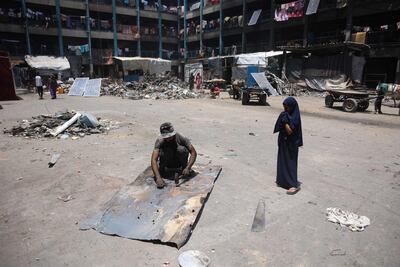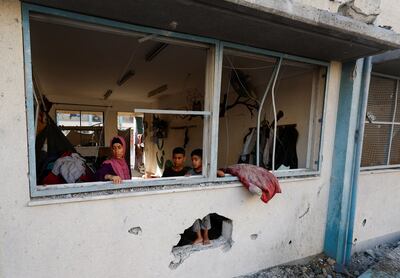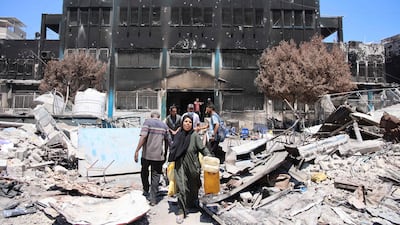Live updates: Follow the latest news on Israel-Gaza
Residents of Gaza once considered schools runs by UNRWA, the UN agency for Palestinian refugees, as places of refuge. But they have now become synonymous with danger after suffering repeated Israeli attacks in the current Israel-Gaza war.
Despite this, families living in the schools say they have little choice amid the widespread devastation caused by nearly nine months of bombardment and a ground offensive by the Israeli military.
Sohaib Al Masri, 41, moved with his family to a school in Jabalia refugee camp in northern Gaza shortly after war broke out in October. His home in the nearby Beit Hanoun area was destroyed in an Israeli bombing that left one of his eight children paralysed.
“Schools are supposed to be safe and not subject to any targeting,” he told The National. “Throughout our lives, in any war or escalation, we have sought refuge in schools because they are said to be protected by international law, and attacks on them are strictly prohibited.”
But the Ayyubid School, where his family was living in the Abu Zaytoun area of Jabalia, was hit by Israeli tank fire last month when troops invaded the camp, he said.
According to the Geneva-based Euro-Med Human Rights Monitor, six schools in Jabalia run by UNRWA were targeted by Israeli shelling and gunfire during the fighting between soldiers and Palestinian militants.

UNRWA chief Philippe Lazzarini said on Tuesday that 190 of the agency's sites in Gaza had been “hit or damaged or targeted” since the war began – “more than half the number of premises and the infrastructure that we have in the Gaza Strip”.
“These premises and these shelters are also used by the population to seek what remains as a possible protection. But more than 500 people so far have been killed while seeking UN protection,” Mr Lazzarini told a meeting of the agency's advisory commission in Geneva.
He said UNRWA and other UN agencies had “paid a heavy price” in the war.
“More than 200 humanitarian staff have been killed, among them 193 only from my own organisation,” he said.
They are among more than 37,700 people killed and 86,000 injured in Gaza since the war began, according to the territory's health ministry.
The war began after the Hamas militant group killed about 1,200 people and took about 250 hostage in an attack on southern Israel on October 7.

Mousa Sawy, a 46-year-old father of nine, was severely injured in an attack on an UNRWA school in the Al Fakhoura area of northern Gaza, where his family was living after their home in Tel Al Zaatar was destroyed in the early days of the war.
“At the beginning of the war, I went through a very tough experience when I got injured at [the] UNRWA-run school in Al Fakhoura,” Mr Sawy told The National.
“I was there with my wife, lighting a fire to cook for the children, and suddenly, an Israeli missile struck. I suffered a severe abdominal injury that kept me in pain for three months, and my wife and daughters also sustained minor injuries. Many people were martyred that day,” he said.
The family moved to another UNRWA school and live in a classroom, which Mr Sawy said was better than living in a tent in hot weather without any facilities, as many displaced Gazans have been forced to do.
“Here we can be reached for aid and water [deliveries], but no one will look for us outside the school or in a tent,” he said.
However, they live in fear of another attack.
“We believed when we moved to the schools that it would be a safe place for us, especially since they have the United Nations logo and are well-known locations to the Israeli army,” Mr Sawy said. “Schools are no longer safe, and targeting them has become normal without affecting global opinion.
“Every minute, we imagine that we will be targeted and bombed because, literally, there is no safe place left in Gaza.”
Mr Al Masri and his family, who returned to the Ayyubid School in Jabalia after the fighting ended, also say they live “in constant fear of Israeli shelling or targeting”.
“In previous wars, there were not many attacks on schools, but in this war, everything has changed,” he said.

